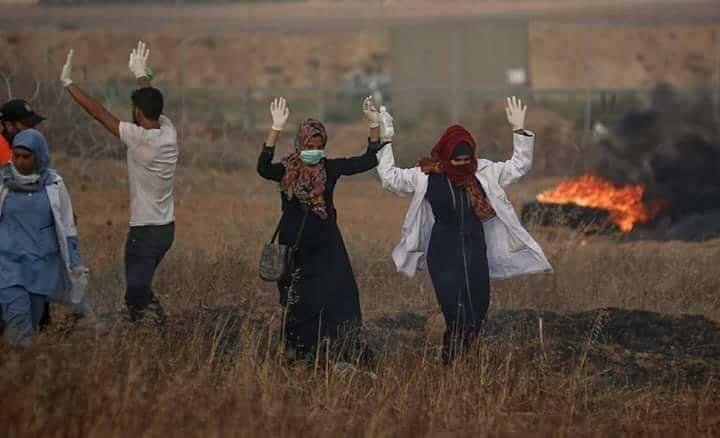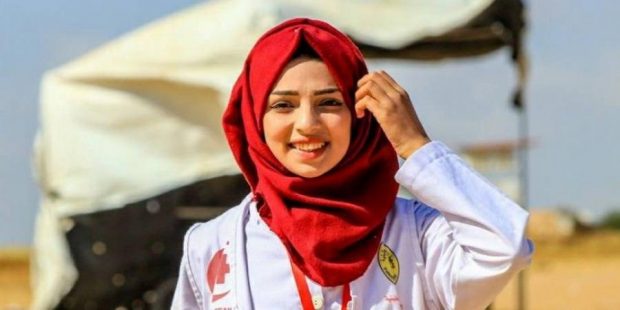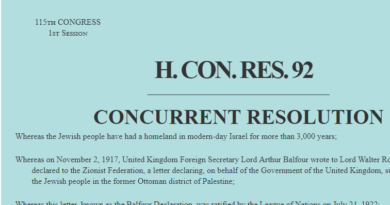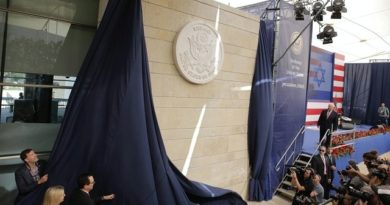US Blocks UNSC Resolution to Protect Palestinian Civilians as Israeli Snipers Murder Palestinian Medic
US casts sole veto against resolution to protect Palestinian civilians
The United Nations Security Council (UNSC) met on Friday to consider a resolution in response to the killing of dozens of Palestinians in Gaza by Israeli military forces during the recent “Great March of Return” protests. At the climax of demonstrations on 14 May to mark “al-Nakba” or “the Catastrophe,” by which Palestinians remember their mass displacement during the 1948-1949 war, at least 60 Palestinians were killed at the border fence by Israeli military forces who fired live ammunition, rubber bullets and tear gas. The official opening of the U.S. Embassy in Jerusalem was held that same day.
Two competing resolutions were proposed at the UNSC meeting on Friday. One proposal was submitted by Kuwait, which urged the Council to consider “measures to guarantee the safety and protection” of Palestinian civilians and requested a report from the UN Secretary-General on a possible “international protection mechanism.” The Kuwaiti proposal garnered 10 votes in favor, but the US vetoed the text on the basis that it said failed to even mention Hamas and the group’s “responsibility” for protecting civilians. Four countries abstained from voting on the Kuwaiti resolution. If one of the Council’s five permanent members – China, France, Russia, the United Kingdom or the US – casts a negative vote on a resolution, the text cannot be adopted.
Israel has a responsibility to calibrate its use of force, to not use lethal force, except as a last resort.
-Nickolay Mladenov, UN Special Coordinator for the Middle East Peace Process
Before voting on the Kuwaiti text, US Ambassador Nikki Haley said that Hamas, which the US has deemed a terrorist group, bore primary responsibility for the “awful” living conditions faced by civilians in Gaza. Immediately following the US veto, Mansour Ayyad Al-Otaibi, Permanent Representative of Kuwait to the UN, said that the failed resolution had been submitted on behalf of the Arab countries and was supported by the Organization of Islamic Cooperation (OIC) at its recent summit in Istanbul.
The UN Special Coordinator for the Middle East Peace Process, Nickolay Mladenov, said during the deliberations that “Israel has a responsibility to calibrate its use of force, to not use lethal force, except as a last resort.” Mr. Mladenov also called on Hamas, not to use the protests as an excuse for carrying out violent attacks at the border, and to provoke Israeli forces.
The other proposal on the Palestinian matter was submitted by the United States, which would have called on Hamas and Islamic Jihad to “cease all violent activity and provocative actions, including along the boundary fence.” According to the UN, this text did not get any support except from the US itself, with three Security Council Members rejecting it and 11 abstaining. Several UNSC members said the US text was tabled without prior consultation, and did not take into account the overall context of the Israel-Palestine conflict.

Meanwhile, Israeli snipers murder medic attempting to give aid to wounded protester
The Palestinian protests along the Gaza border fence resumed on Friday, the same day the UNSC was considering the resolution regarding the protection of Palestinian protesters discussed above. At possibly the same time the United States was vetoing the resolution to protect Palestinian protesters, Israeli snipers shot and killed a 21-year-old Palestinian medic named Razan al-Najjar who was attempting to provide aid to an injured protester. Ms. Najjar was the 119th Palestinian killed since the protests began in March, according to Gaza health officials. Hers was the only fatality registered on Friday.
According to the New York Times, Ms. Najjar was dressed in her white coat to tend to an elderly man who had been hit in the head by a tear-gas canister. The Israeli military has provided no explanation for the shooting but said Saturday that the case would be examined. The New York Times article (linked below) also stated that it had actually interviewed Ms. Najjar last month as part of a report on the protests. On Friday, she was less than 100 yards from the Gaza border fence when she was bandaging the man struck by the tear gas canister.
According to an unconfirmed photo (above) of Ms. Najjar taken shortly before Israeli snipers took her life, Razan al-Najjar was clearly wearing a white medic coat, proceeding presumably toward the man struck by the tear gas canister with her hands in the air wearing latex gloves. In a video interview posted to Twitter on Saturday, a woman identified as Ms. Najjar’s mother held up a blood-soaked vest and said, “This is my daughter’s weapon with which she was fighting the Zionists.” The woman also held up two unopened bandage rolls she said she found in the vest and said, “These were her ammunition.”
On Saturday, a group of United Nations agencies issued a statement expressing outrage over the killing of “a clearly identified medical staffer,” calling it “particularly reprehensible.” (See link below).
This isn’t the first unarmed young woman the Israel military has struck down
It is questionable whether the Israeli government will prosecute their sniper for any wrongdoing. Israel has a history of excusing the murder of non-Jews by Jewish people, as highlighted by the murder of 23-year-old American activist, Rachel Corrie on March 16, 2003 by an Israeli military bulldozer that crushed her when protesting the demolishing of Palestinian homes. The Israeli military investigation concluded that the operator of the bulldozer could not see her due to limited visibility. A link to a video of the incident is provided below so you can judge the veracity of that story for yourself.
Resource Links:
- Security Council fails to adopt competing texts on protection of Palestinian civilians in Gaza, UN News, June 1, 2018
- A Woman Dedicated to Saving Lives Loses Hers in Gaza Violence, The New York Times, June 2, 2018
- In memory of Razan al-Najjar, +972Mag.com, June 3, 2018
- A photo taken moments before volunteer paramedic, Razan Alnajjar was murdered by Israeli snipers, shows her & her colleagues with hands up as they were heading to treat injured protesters. (She’s the one in the white)
- UN agencies deeply concerned over killing of health volunteer in Gaza, United Nations Office for the Coordination of Humanitarian Affairs [Press Release], June 2, 2018
- Rachel Corrie: REAL Footage of death (Warning, disturbing imagery)
- The Rachel Corrie Foundation for Peace & Justice
- Images of Razan al-Najjar credited to Internet.
Related:
- UN Human Rights Chief: Israeli force used against Gaza protesters ‘wholly disproportionate’, May 18, 2018
- Israel Slaughters Dozens of Protesters, Trump Touts “Low Cost” of Embassy Move, May 15, 2018
- House Passes Bipartisan Resolution in Support of Israel, May 10, 2018
- Trump White House Formally Recognizes Jerusalem as the Capital of Israel, December 6, 2017
- Why Does Congress Want to Celebrate the Balfour Declaration?, November 17, 2017



